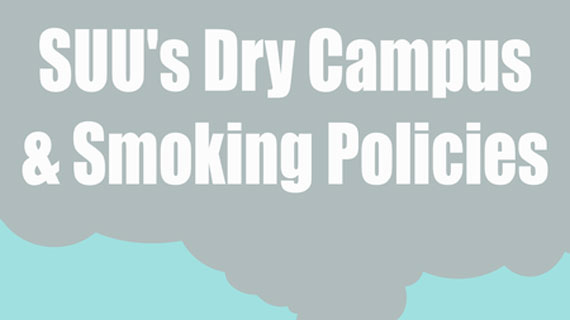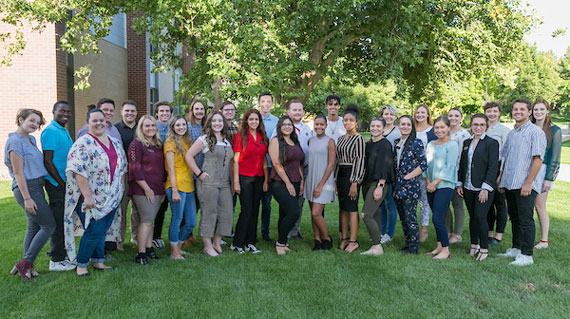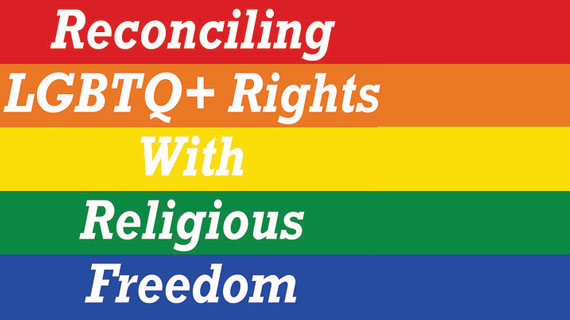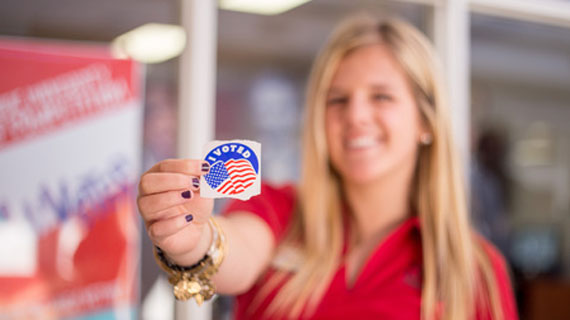Pizza & Politics - SUU Smoking and Drinking Policies
Posted: December 07, 2018 | Author: Cami Mathews | Read Time: 4 minutes

The Michael O. Leavitt Center for Politics and Public Service hosts Pizza & Politics every Wednesday at noon to discuss a current political topic. Leavitt Center student employees research the topic and moderate the conversation. These discussions expose students to a variety of important issues and encourages them to share their own perspectives while learning all sides of an issue. Free pizza is provided for all who attend.
The Leavitt Center decided to take national topics of drinking and smoking and apply them to Southern Utah University. The discussion looked at the tobacco and alcohol policies for campus and how they affect visitors. Moderators for the discussion were Miles Anderson and Emilie Elizalde, seniors from North Logan, Utah and Las Vegas, Nevada, respectively.
Smoking is the leading cause of preventable death in the United States. Cigarette smoking is responsible for more than 480,000 deaths per year in the U.S., including more than 41,000 deaths from secondhand smoke. In 2015, one in five adults aged 18 to 24 reported using a tobacco product some days or every day.
At SUU, policy 5.28 of the Policies and Procedures states, “pursuant to the Utah Clean Air Act, smoking is prohibited in all campus buildings. Additionally, the statute provides that there shall be no smoking within 25 feet of any public building.”
Discussion began with general feelings on the current smoking policy at SUU. Most students said they were fine with it, but felt it was not enforced. Countless stories emerged where students would walk right outside of a building and be hit with a cloud of smoke. The policy may outline the best procedures, but no one sticks to it.
It has been proposed to change the smoking policy, choosing from either a tobacco-free campus or a smoke-free campus. The tobacco free campus is, “a campus that prohibits the use of tobacco products (including but are not limited to cigarettes, cigars, pipes, water pipes [hookah], smokeless tobacco, chewing tobacco, snuff, electronic cigarettes, vape pens, and any non-FDA approved nicotine delivery device).”
A smoke-free campus is, “a campus that prohibits smoking on campus (smoking is defined as inhaling, exhaling, burning, carrying or possessing any lighted cigarette, cigar, pipe, electronic cigarette, vape pen, hookah, or other lit product and including the use of any substance, including but not limited to tobacco, cloves, or marijuana).”
Asking students which proposal they would be more likely to support, a majority said the tobacco-free campus. If some substances are going to be banned, all substances should be banned. Students know there is just as much health damage with chewing tobacco as there is with cigarettes.
Looking at the effect of a smoke-free campus on marginalized groups, data from Lung.org was given to showcase the smoking rates among racial and ethnic populations. In total, 21.9% of Native Americans / Alaska Natives smoke. The next highest were African-Americans with 16.8%, followed by Whites with 16.6%. Hispanics and Asian-Americans smoke the least, with 10.1% and 7.0%, respectively.
Specifically at SUU, students were worried about marginalized groups being affected by a smoke-free campus policy. People pointed out that minority students already have a lot of barriers in their way when attending college. If SUU were to add another barrier, like forcing people to not smoke on campus, some students might be deterred from attending.
Jumping to the SUU alcoholic beverages policy, 5.40 of the Policies and Procedures states, “as a matter of institutional policy, alcohol possession and consumption is generally prohibited on campus; however, there may be times when alcohol consumption is permitted on campus for ceremonies, receptions, fundraisers, and/or private events sponsored by clients who rent university facilities.”
Students thought if smoking was allowed, drinking should be allowed as well. A lot of comments pointed to the state’s religious influences and how that typically leads to dry campuses. Other people pointed out that the school could see an increase in revenue from food sales. Students specifically stated that beer and some liquor should be sold at sporting events. A lot of students naturally drink while they tailgate, why not allow SUU to gain some of the profit?
To wrap up the conversation, students were asked where the line is between protecting rights and protecting public health. With smoking, the line is more with public health because of the effects of secondhand smoke. With drinking, though deaths can occur, people felt it was more of a right to choose whether or not to drink on campus. Either way, students wanted more freedom and choices available at SUU.
For more information on Pizza & Politics and the Leavitt Center, visit their website.
This article was published more than 3 years ago and might contain outdated information or broken links. As a result, its accuracy cannot be guaranteed.
Tags: Student Leavitt Center



